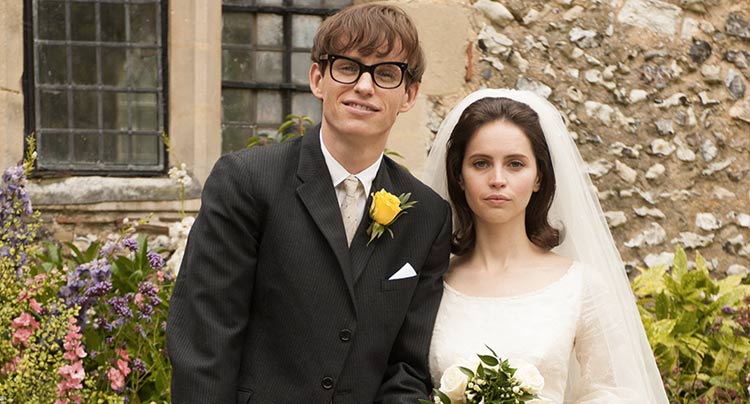
Features one of the best performances seen all year. More than just a love story, it's an uplifting story of ambition and hope.

Features one of the best performances seen all year. More than just a love story, it's an uplifting story of ambition and hope.
Famous theoretical physicist Stephen Hawking is an extraordinary man with monumental achievements, advancing our understanding of how the universe works while simultaneously battling a disease that left him nearly paralyzed and unable to speak. It’s a tragedy to us all that one of the most brilliant minds of our time lost the ability to communicate his thoughts with traditional methods due to Lou Gherig’s disease. But the story that most people don’t hear about is how he fell deeply in love with a fellow student at Cambridge, his first wife Jane Hawking, and how her encouragement and care allowed him to become one of the most revered minds of his field despite his physical obstacles. The Theory of Everything is an adaptation of Jane’s memoir “Traveling to Infinity: My Life With Stephen”, which recalls how the two met and the journey they faced early in their lives.
The Theory of Everything dabbles but doesn’t spend too much time on Hawking’s academic success or how he completely changed quantum mechanics as we know it. It’s frustrating not to be invited into the scientific side of this great man’s mind, but the film makes it clear this isn’t it’s focus. The true core of the film is a love story. A young Stephen (Eddie Redmayne) can’t seem to take his eyes off a dashing girl at a party. This lovely young woman, named Jane (Felicity Jones), returns his glances and before long falls head over heels for this ambitious man. A man determined to face the mind-numbing challenge of finding a unified equation that explains everything in the universe.
The film shows early signs that Stephen’s physical abilities are on the decline, the slightest of shadows of the tragedy that lies ahead. One day while walking on campus Stephen collapses to the ground and is knocked unconscious. Doctors tell him that he has a motor-neuron disease and that he has two years left to live. Stephen’s outlook is bleak, but Jane refuses to give up even as he faces the knowledge that even if his time isn’t as limited as the doctor’s suggest, the eventuality that he will lose control of his body and voice is impending. The two of them decide to marry in the midst of this news, and as the symptoms grow ever clearer, they start a family together while Jane’s duties get increasingly more difficult as caretaker.

There’s no denying that Eddie Redmayne puts on an absolute brilliant performance in the physically demanding role which requires an entirely different and difficult communication portrayal and very limited mobility. It’s such a transformation that Redmayne is almost unrecognizable by the end. Any early Oscar buzz surrounding Redmayne is well deserved. Felicity Jones does a commendable job of being a fearless leader and an overworked mother, though, by no fault of her own, is rather overshadowed by Redmayne’s dazzling work.
The Theory of Everything is more than just a love story, it’s an uplifting story of ambition and hope. Sure, there are conventional storytelling and textbook biopic clichés, but damned if they’re not arranged in a spectacular way, all highlighting one of the best performances seen all year, with visuals that perfectly depict every very real struggle and joy.
James Marsh, who is best known for his documentaries (Man on Wire, Project Nim), is the perfect candidate to handle the difficult task of chronicling the crowning achievements and struggles of Professor Hawking in just two hours. The Theory of Everything received collective cheers, thunderous laughs, and in its final moments, the drop of a pin would be the loudest sound heard. I’m fairly sure no one left the theater with dry eyes.
This review was originally published on 9/9/14